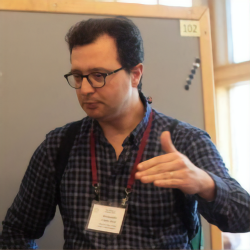Host association studies of Salmonella Typhimurium using Machine Learning: Replacement of phage typing
Salmonella enterica serovar Typhimurium (S. Typhimurium) comprises a group of closely related human and animal pathogens that account for a large proportion of all Salmonella infections globally. It is associated with foodborne gastroenteritis outbreaks and in some cases invasive illness and deaths. Characterization of S. Typhimurium and identification of clusters of isolates associated with specific sources is therefore crucial for epidemiological surveillance.
Start date
1 April 2023Duration
3.5 yearsApplication deadline
Funding source
Jointly funded by Faculty of Health and Medical Sciences, University of Surrey and Animal and Plant Health Agency.Funding information
Funding is for 3.5 years and includes UKRI-aligned stipend (£17,668 pa for 2022-23), approved University of Surrey fees and a research budget. This studentship is jointly funded by Faculty of Health and Medical Sciences, University of Surrey and Animal and Plant Health Agency.
About
Salmonella enterica serovar Typhimurium (S. Typhimurium) comprises a group of closely related human and animal pathogens that account for a large proportion of all Salmonella infections globally. It is associated with foodborne gastroenteritis outbreaks and in some cases invasive illness and deaths. Characterization of S. Typhimurium and identification of clusters of isolates associated with specific sources is therefore crucial for epidemiological surveillance. Phage typing has been used for decades for subtyping of S. Typhimurium to determine the epidemiological relation among isolates. Recent studies have however suggested that the high-throughput next generation sequencing methodologies have the potential to replace phage typing. Machine Learning (ML) tools that are defined by algorithms capable of recognizing patterns in large and complex datasets have become useful for analysing DNA sequence data. The algorithms identify features in the dataset relevant for the purpose of the model, such as source attribution (SA) or identification of signatures associated with host-specificity, enabling the model to make strong predictions. The ML mathematical models learn from data and improve iteratively.
By using defined S. Typhimurium isolates of different definitive phage types (DTs) and their whole genome sequencing data in this PhD you will aim to identify novel markers associated with host- adaptation to replace the current phage typing method that provides guidance on likely wildlife or other host-associated sources of Salmonella Typhimurium infecting food animals. A combination of traditional microbiology, phylogenetic analyses and ML will link genotype with phenotype, and generate testable hypotheses that can be addressed using classical molecular biology approaches. We anticipate that this work will identify candidate molecular markers for the replacement of the traditional page typing for S. Typhimurium causing food borne disease. The overall benefits from the completed work will be ensuring true comparability and the interpretation of WGS data for Salmonella in a one-health perspective in order to exploit the well-established benefits of WGS for future integrated surveillance and control of foodborne infections in the UK, in the context of developments in Europe and world-wide.
The project will be conducted at the University of Surrey, under the supervision of Drs. Alexessander Couto Alves and Jennifer Ritchie within the Surrey Artificial Intelligence Institute, the Bioinformatics Core Facility, and Dr Liljana Petrovska leading the Genomic Bacteriology Team at the Animal and Plant Health Agency (APHA) with access to other core facilities at the University of Surrey and APHA. The student will benefit from computing and research resources from AI Institute and APHA. At the AI Institute and APHA team the student will benefit from a vibrant and collegial environment with technical and bioinformatics expertise and infrastructure to provide training and support.
Eligibility criteria
Open to UK students with the project starting in April 2023.
You will need to meet the minimum entry requirements for our PhD programme https://www.surrey.ac.uk/postgraduate/biosciences-and-medicine-phd#entry.
How to apply
Applicants are strongly encouraged to contact the relevant principal supervisor(s) to discuss the project(s) before submitting their application.
Applications should be submitted via the [https://www.surrey.ac.uk/postgraduate/biosciences-and-medicine-phd programme page (N.B. Please select the April 2023 start date when applying).
When completing your application, in place of a research proposal, please provide a brief motivational document (1 page maximum) which specifies:
- the project title(s) and principal supervisor name(s)
- an explanation of your motivations for wanting to study for a PhD
Additionally, to complete a full application, you MUST also email a copy of your CV and 1-page motivational document directly to the relevant project principal supervisor of each project you apply for. Due to short turnaround times for applicant shortlisting, failure to do this may mean that your application is not considered.
Please note that online interviews for shortlisted applicants are expected to take place during the week commencing 6th of March.
Biosciences and Medicine PhD
Studentship FAQs
Read our studentship FAQs to find out more about applying and funding.
Application deadline
Contact details

Studentships at Surrey
We have a wide range of studentship opportunities available.

